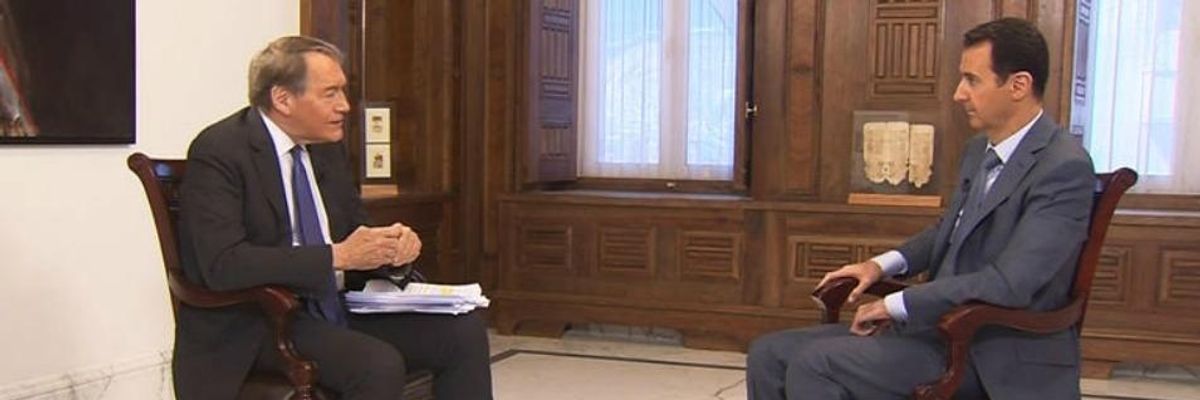In an interview with Charlie Rose that aired on CBS News' 60 Minutes Sunday night, Syria's President Bashar al-Assad said American airstrikes that began last year against Islamic State (or ISIS) inside his country are doing little to benefit his own fight against the militant force but are having the undesirable side effect of increasing the number of fighters from across the region (and the world) who are flocking to join the group.
"How much of a benefit are you getting from American airstrikes in Syria reducing the power of ISIS?" Rose asked in the interview that took place just days ago in Damascus.
Al-Assad responded by pointing out that the U.S. government and its allies want to "sugar coat the situation" inside Syria by telling the world that ISIS "is being defeated" and that airstrikes are making things better. "Actually, no," said Assad, "you have more recruits [coming to ISIS]. Some estimates that they have 1,000 recruits every month in Syria. And Iraq -- they are expanding in Libya and many other al Qaeda affiliate organizations have announced their allegiance to ISIS. So that's the situation."
The idea of foreign militants who have flocked to the civil war in Syria is one that Assad also spoke about last month in an interview with Foreign Affairs when he explained that defeating ISIS would not be problematic for the Syrian Army if it wasn't for the constant flow of new recruits, both from inside Syria and those flowing across the nation's now porous borders. Most of these, he said, are financed by Saudi Arabia and Qatar. "We don't have a problem militarily," he explained. "The problem is that they still have this continuous supply, mainly from Turkey."
And these are not only the self-interested arguments of the Syrian president. Foreign policy experts and journalists have continually warned (here, here, here) that western intervention and the ongoing presence of the U.S. military in the region and the ongoing airstrikes have acted, and would continue to act, as an easy recruiting tool for ISIS - not only in Syria and Iraq, but elsewhere across the region.
In the end, Assad agreed with the premise put forth by Rose that no military solution exists to the Syrian civil war that has now gone for more than four years. "Every conflict," Assad said, "Even if it's a war, should end with a political solution."
Watch the segment:
Asked in his interview with Foreign Affairs what his message to President Obama would be, Assad criticized the history of how the U.S. government continues to back players across the world who benefit U.S. interests, but so often work counter to local desires. In the end, he said, he would tell Obama that such strategies are counter-productive. He said:
"So for the United States, only looking for puppet officials and client states is not how you can serve the interests of your country. You are the greatest power in the world now; you have too many things to disseminate around the world: knowledge, innovation, IT, with its positive repercussions. How can you be the best in these fields yet the worst in the political field? This is a contradiction. That is what I think the American people should analyze and question. Why do you fail in every war? You can create war, you can create problems, but you cannot solve any problem."
And what, from Assad's perspective, would a better Middle East strategy and a policy toward Syria look like?
"One that preserves stability in the Middle East," Assad said. "Syria is the heart of the Middle East. Everybody knows that. If the Middle East is sick, the whole world will be unstable. In 1991, when we started the peace process, we had a lot of hope. Now, after more than 20 years, things are not at square one; they're much below that square. So the policy should be to help peace in the region, to fight terrorism, to promote secularism, to support this area economically, to help upgrade the mind and society, like you did in your country. That is the supposed mission of the United States, not to launch wars. Launching war doesn't make you a great power."

